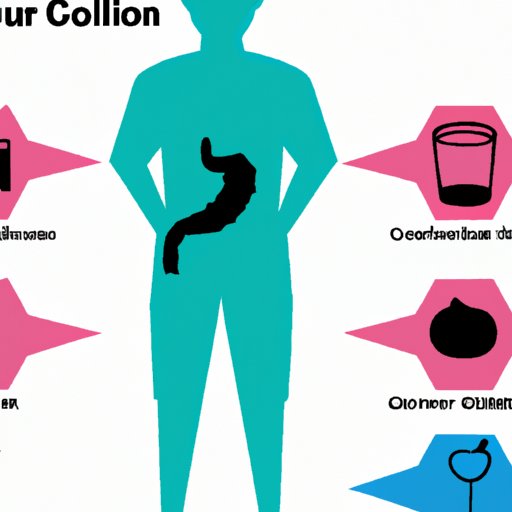Introduction
Colon health is an important part of overall health and well-being. The colon, also known as the large intestine, is responsible for absorbing nutrients from food, removing waste from the body, and regulating the balance of bacteria in the gut. While most people don’t think about their colons on a daily basis, it’s important to be aware of how to keep it functioning properly.
Common issues related to colon health include constipation, diarrhea, irritable bowel syndrome (IBS), and colon cancer. By following some simple steps, you can help reduce your risk of developing these problems and maintain a healthy colon.
Increase Fiber Intake
One of the best ways to keep your colon healthy is by increasing your intake of fiber-rich foods. Fiber is a type of carbohydrate that cannot be digested by the body, but it helps add bulk to stool and aids in digestion. It also helps regulate blood sugar levels and reduces the risk of heart disease.
Fiber-rich foods include whole grains, fruits and vegetables, beans, nuts, and seeds. Aim to eat at least 25 grams of fiber per day. If you’re not used to eating a lot of fiber, start by gradually adding more fiber-rich foods to your diet.
Avoid Processed Foods
Processed foods are typically high in unhealthy fats, sugar, sodium, and preservatives. They can also cause digestive issues and can increase your risk of developing colon cancer. Examples of processed foods include chips, canned soups, frozen meals, and junk food.
It’s best to limit or avoid processed foods as much as possible and focus on eating whole, unprocessed foods. This includes fresh fruits and vegetables, lean proteins, whole grains, and healthy fats.
Drink Plenty of Water
Staying hydrated is essential for proper digestion and colon health. When you’re dehydrated, your body has to work harder to break down food, which can lead to constipation and other digestive issues. Aim to drink eight 8-ounce glasses of water per day.
If plain water isn’t your thing, try adding slices of lemon or lime, mint leaves, or cucumber to add flavor. You can also try herbal teas or sparkling water to mix things up.
Exercise Regularly
Regular exercise can help improve colon health by promoting regular bowel movements. Studies have shown that physical activity can help reduce the risk of constipation and reduce symptoms of IBS. Aim for 30 minutes of moderate exercise five days a week.
Examples of moderate exercise include walking, jogging, swimming, cycling, and dancing. If you’re new to exercise, start slow and gradually increase the intensity and duration of your workouts over time.
Avoid Smoking and Limit Alcohol Consumption
Smoking and excessive alcohol consumption can have a negative impact on colon health. Smoking increases the risk of colon cancer, while alcohol can irritate the lining of the intestines and cause inflammation. It’s best to quit smoking and limit your alcohol consumption to one drink per day.

Have Regular Colon Cancer Screenings
Colon cancer is the third most common form of cancer in the United States. It’s recommended that adults aged 50 and older have a screening every 10 years. If you have a family history of colon cancer, your doctor may recommend more frequent screenings.
Screenings typically involve a colonoscopy or a fecal occult blood test (FOBT). During a colonoscopy, the doctor uses a thin, flexible tube with a tiny camera to examine the inside of the colon. An FOBT involves collecting a sample of your stool and testing it for traces of blood, which can indicate the presence of cancerous cells.
Conclusion
Maintaining a healthy colon is important for overall health and well-being. By increasing your fiber intake, avoiding processed foods, drinking plenty of water, exercising regularly, avoiding smoking and limiting alcohol consumption, and having regular colon cancer screenings, you can help keep your colon healthy and reduce your risk of developing common issues.
Remember, it’s never too late to start making changes to improve your colon health. Talk to your doctor if you have any questions or concerns.
(Note: Is this article not meeting your expectations? Do you have knowledge or insights to share? Unlock new opportunities and expand your reach by joining our authors team. Click Registration to join us and share your expertise with our readers.)
